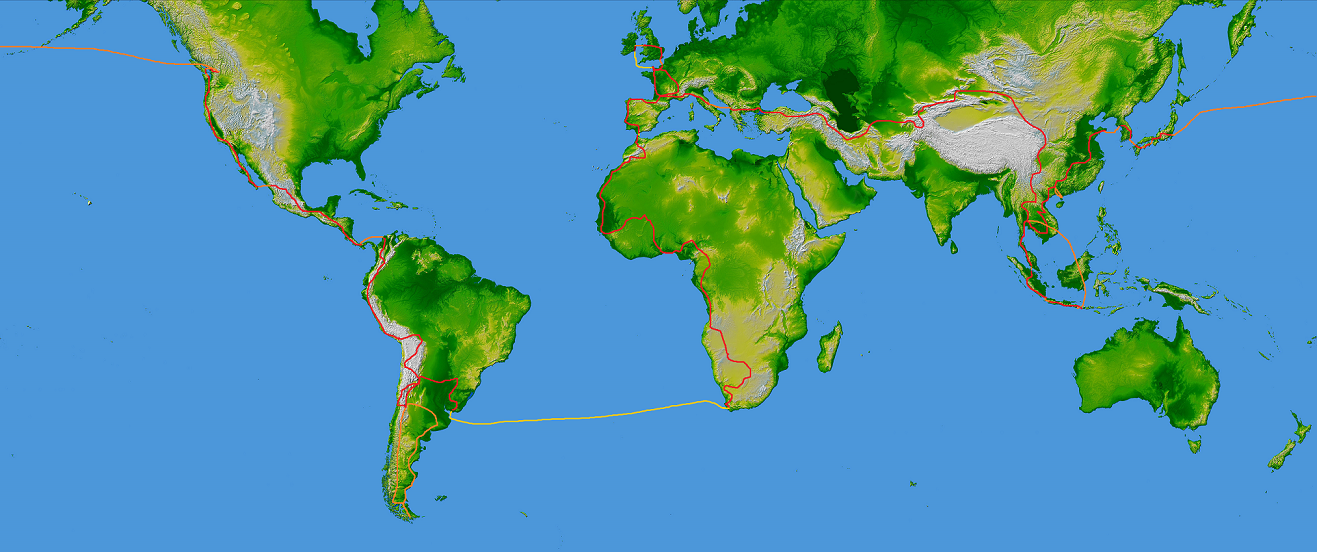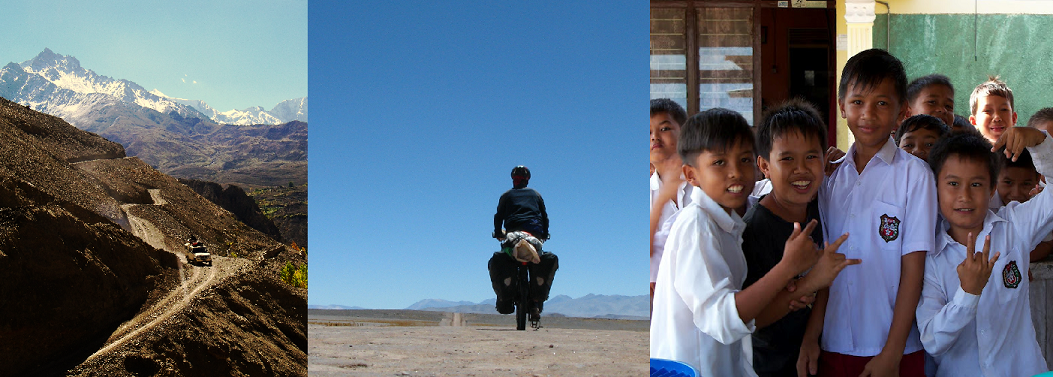Six days until Christmas. If it wasn't for the life-sized Santa Claus who was grinning inanely at me yesterday, as I stumbled past a shop in the late afternoon heat of downtown Bissau, the whole event might have slipped by without me even realising it. Daren and Tatjana, my trusty traveling companions for the past couple of thousand kilometres, presented me with a Christmas gift of a bottle of whiskey last night. Our arrival in the capital of Guinea Bissau marks the end of their mainland Africa stage in their around-the-world-with-a-sore-arse odyssey. Tomorrow morning they fly out to the Cape Verde islands to meet with their families for a couple of weeks, before venturing on to traverse South America. Their company, good humour, and exceptional kindness will be sorely missed by myself and Rocinante, as we prepare to sally forth, further into west Africa.

Tall trees, short cyclist
Over the past few weeks I've been bemoaning to myself and others, how inadequately writing a blog sometimes feels with regard to portraying the experiences that I'm having whilst cycling through the region. So much is lost in translation, so little makes it to the screen. Yet for all that, I guess it's a good way of sharing at least some of the moments and letting all five of you who read this know how I'm getting along.

Ziguinchor, Senegal
After the immensity of the desert regions, everything is once again on a more human scale. Countries have shrunk to the point where it would be possible to cross two or even three international borders in a day's ride. Since leaving the Gambia a few days ago, we crossed back into Senegal's southern province of Basse Casamance. We left behind the more well-trodden tourist trails around the Gambian and Senegalese coast further north, and continued across Casamance to Ziguinchor. Despite some initial foreboding about crossing Casamance due to a rise in banditary earlier in the year, we were reassured by all whom we asked in the Gambia that the region should be fine to cross. While the region has been stable after a cease fire a couple of years ago between the separatist rebels and the government in Dakar, earlier this year some of the former rebels have turned to highway banditary and they continue to intimidate and attack the local population.
After camping up close to the Gambian/Senegalese border, we entered Casamance early in the morning and reached the capital, Ziguinchor, later that afternoon. The ride across the province was punctuated by friendly encounters with people in the villages, over which hung a huge variety of tropical trees, including mango and the ubiquitous palm. The only reminder of the trouble in the province came from passing army patrols and soldier's observation posts, hidden in the dense growth along the roadside. We were first made aware of the posts when we stopped for a break and some camoflaged figures emerged from the tall grass. The young soldier, along with the others, were from Dakar and had been based in the region for a few months. After a friendly discussion about our trip, we headed down the road to find somewhere else to stop. Later on a soldier, whom had been engrossed in a book when I sailed past, challenged Daren and Tatjana about why they were there and asked to see their weapons. After a few more moments of silly questions that only egotists in a uniform would think to ask, he let them go.

Leaving Ingore, Guinea-Bissau
After a night in Ziguinchor, the region's capital, we continued south to the border with Guinea Bissau and after a reasonably thorough search of our bags and ourselves by the Senegalese police, looking for samples of Casamance's economically vital, but illegal, cannabis crop, we entered our third country in one week. Left in a dreadful state by the Portuguese colonists, Guinea Bissau has struggled to escape from the yoke of it's cashew nut dependent economy and political instability has characterised the country for much of its existence, the most recent coup attempt occuring less than a month ago. Yet despite the threat of instability, the country has been a joy to cycle through. Border guards and uniformed officials at police checkpoints have been very welcoming. We stopped over in the small town of Ingore on our first night in the country and wandered around the stalls in the dark looking for ingredients to add to our pot of pasta. The strain on infrastructure is not simply confined to the small towns, however, as we found out when we arrived into Bissau.
It appears that there is currently no electricity grid or running water in the city, with shops and guesthouses having to rely on generators to produce the electricity they need. This collapse of essential services has meant that epidemics, such as a cholera outbreak earlier this year, have greatly affected the population. Amidst this situation, and the energy sapping climate, it's hard to imagine the relentless consumerism that is no doubt gathering pace further north, and yet once again, the ability of people to survive, smile, and laugh, despite the circumstances that they find themselves living in, continues to astound me. I'm not sure yet where I'll be on Christmas day, although there is a tentative arrangement to rendevous with Peter, a Polish cyclist whom we first met in Mauritania, across the border in the Fouta Djalon mountains in the Republic of Guinea. I might not rise to a turkey, but at least I can now manage a toast with some of my Scotch.

I love sunsets. Bissau, Guinea-Bissau
Wishing everyone a very happy festive season and New Year from Bissau!
Bissau, Guinea-Bissau
Trip distance: 8959 km








